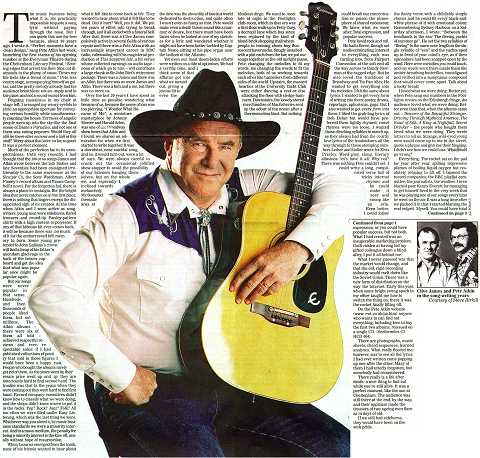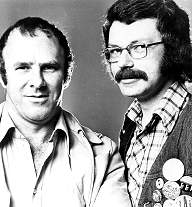by Clive James
'The audience loved what we were doing. Better still, the people who bought our albums loved
Feigning casualness in my chair at stage left, I arranged my weary eyelids to yield an appropriate aperture for conveying serious humility while simultaneously counting the house. Terraces of angelic people went up into the sky like the final scene of Dante's Paradiso, and not one of them was eating popcorn. Would they all still be there after an hour and a half of this stuff? Worry about that later: so far, so good. It was a perfect moment.
Much of this perfection lay in its unexpectedness. Until very recently, I had thought that the 100 or so songs James and Atkin wrote between the late Sixties and late Seventies had been consigned irretrievably to the same warehouse as the Sinclair C5, the Sony Watchman, Albert Finney's record album and Naomi Campbell's novel. For the forgotten fad, there is always a place in nostalgia. For the bright idea that never catches on in the first place, there is nothing that lingers except the disappointed sigh of its creator. At the time when Atkin and I were active as songwriters, young men wore sideburns, flared trousers and round-tip Paisley-pattern shirts with a high content of polyester. If any of that hideous kit ever comes back, it will be because there was too much of it for the embarrassed folk memory to burn. Some young pretender to John Galliano's crown will find a heap of his father's quondam glad-rags in the back of the broom cupboard and get the idea that what was popular once might be popular again.
But our songs were never popular in that sense. Hundreds, and then thousands of people liked them, but not millions. The Atkin albums - there were six of them all told - achieved respectable reviews and even respectable sales: if I had published collections of poetry that sold in those figures I would have been a happy man. People who bought the albums rarely got rid of them. As the years went by, their resale values went up and up: they are notoriously hard to find second hand. The trouble was that in the years when they were coming out they were hard to find first hand. Record company executives didn't know how to classify what we were doing, and the shops didn't know where to put it in the racks. Pop? Rock? Jazz? Folk? All too often we were filed under Easy Listening, which was the last thing we were. Whichever way you sliced it, by music business standards we were a minority interest. And in a mass medium, the penalty for being a minority interest is the kiss-off, usually without hope of resurrection.
When Lazarus emerged from the tomb, none of his friends wanted to hear about what it felt like to come back to life. They wanted to hear about what it felt like to be dead. Did it hurt? Well, yes it did. We put ten years of effort into trying to break through, and it all ended with a funeral bell. After that there was a Clive James compulsively active in several fields of various repute and there was a Pete Atkin with an increasingly important career in BBC radio, culminating in his magisterial production of This Sceptred Isle, a hit series whose collected earnings on audio tape - none of which go to him - will contribute a large chunk to Sir John Birt's retirement package. There was a James and there was an Atkin, but there was no more James and Atkin. There was a him and a me, but there was no more us.
Over the last 20 years I have spent as little time as possible wondering what became of us, because the sense of loss was too piercing. "I Wonder What Became of Me", a miniature masterpiece by Johnny Mercer and Harold Arlen, was one of the Broadway show tunes that Atkin and I found we shared an admiration for when we first started to write together. It was a downbeat, near-suicidal song, and so, it would turn out, were a lot of ours. We were always careful to crank out the occasional jollified show-stopper to avoid the possibility of our audience hanging themselves, but on the whole we, and especially I, inclined towards melancholy. My favoured thematic area at the time was the absurdity of love in a world dedicated to destruction, and quite often I wasn't even as funny as that. Pete would make even a death threat sound like a murmur of desire, but there must have been times when he looked at one of my sketches for a lyric and wondered whether it might not have been better tackled by Captain Nemo sitting at his pipe organ near the bottom of the Atlantic.
Yet even our most doom-laden efforts were written on a tide of optimism. We had a terrific time, and I think that some of that afflatus got into what we turned out, giving a joyous lilt to even the bleakest dirge. We used to meet late at night in the Footlights club-room, which in the era was a first-floor walk-up in Petty Cury, a decrepit lane which has since been replaced by the kind of blond-brick shopping mall where people in training shoes buy fluorescent haversacks. Snugly installed with a pint each from the bar, we put our songs together at the old upright piano, Pete changing the melodies to fit my words, me changing the words to fit the melodies, both of us working towards each other like tunnellers from different sides of the world. Upstairs, the massed hearties of the University Yacht Club were either dancing a reel or else attacking the floor with sledge-hammers. Downstairs, the loosely stored merchandise of Macfisheries sent up the odour of the ocean after a thermonuclear blast. But nothing could break our concentration or poison the atmosphere of shared endeavour. We knew what we were after. Total expression, and popular success.
I loved what we were doing. Better yet, when Pete sang our numbers in the Footlights reviews on the Edinburgh fringe, the audience loved what we were doing. Better even than that, when the albums came out - Beware of the Beautiful Stranger, Driving Through Mythical America, The Road of Silk, A King at Nightfall, Secret Drinker - the people who bought them loved what we were doing. They wrote letters to tell us. Strange wild-eyed young men would come up to me in the street, quote a phrase and give me their blessing. I didn't see how we could lose. What could go wrong?
Everything. The rocket sat on the pad for year after year, spilling impressive plumes of boiling liquid oxygen but resolutely refusing to lift off. I blamed the record companies, the BBC playlist committee, the journalists, the weather. I even blamed poor Kenny Everett for managing to get himself fired in the very week that he was playing one of our songs every time he went on air. It was a long time after we packed it in that I started blaming the real culprit. Myself. You could have total expression, or you could have popular success, but not both. What I had created was an insuperable marketing problem. Guilt-ridden at having led my gifted colleague down a blind-alley, I put it all behind me.
What I never guessed was that the market would change, and that the old, rigid recording industry would melt down like the Soviet Union. There was a new form of distribution on the way: the Internet. Earlier this year, when some bright young spark in my office taught me how to switch the thing on, there it was: the rocket finally lifting off.
On the Pete Atkin website (www.rwt.co.uk/pa.htm) anyone who wants to can find out everything, including how to buy the first two albums, reissued on a single CD (Seeformiles C5 HCD 664).
There are photographs, music sheets, chord sequences, learned analyses. What really floored me, however, was to see all the lyrics I had ever written come popping up one after the other. Many of them I had utterly forgotten, but somebody had remembered.
There really is a life after death: a nice thing to find out while you're still alive. It was a perfect moment, like the one at Cheltenham. The audience was still there at the end, by the way, and their applause made the trousers of two ageing men flare as in days of old.
If we still had sideburns, they would have been on fire with pride.
Clive James and Pete Atkin in the song-writing years
Back to the Pete Atkin home page
what we were doing. They wrote letters to tell us. Strange, wild-eyed young men would come
up to me in the street. I didn't see how we could lose. What could go wrong? Everything...'

The music business being what it is, it's practically impossible to quote a song lyric without paying through the nose. But I can quote this one for free because, about thirty years ago, I wrote it. "Perfect moments have a clean design," sang Pete Atkin last week, launching the first stanza of his opening number at the Everyman Theatre during the Cheltenham Literary Festival. "Scoring edges that arrest the flow/ Skis cut diamonds in the plump of snow/ Times my life feels like a friend of mine." Pete was centre stage, accompanying himself on guitar, and the pretty melody already had his audience breathless: not an empty seat in the place, and not a sound except from him.
Pete loved rock and roll. He had a fierce, though not undiscriminating, interest in everything rock was turning into, from Fairport Convention at the soft end all the way across to Randy Newman at the ragged edge. But he also loved the traditions of Broadway and Tin Pan Alley. He wanted to get everything into his melodies. I felt the same about lyrics. I wanted to get every form of writing into them: poetry, drama, reportage, aphorisms, gags. But I also wanted to get every form into them. I liked the grab-bag lyrics of Bob Dylan but would have preferred them tightly rhymed; vowel rhymes were too loose. I wanted those clinching syllables to match up, as they always had from the courtly love lyrics of the troubadours all the way through to those stomping numbers Lieber and Stoller wrote for Elvis Presley. Word play, slang, literary allusions: let's have it all. Why not? There was nothing Pete couldn't set. I could write a long, complicated verse full of tricky internal rhymes and he could make it soar and swoop like an aria. Even better, I could follow the flashy verse with a childishly simple chorus and he could fill every black-and-white phrase of it with emotional colour. Remembering Sydney Harbour on a Saturday afternoon, I wrote: "Between the headlands to the sea/ The fleeing yachts of summer go". He set the two syllables of "fleeing" to the same note-length as the single syllable of "sea" and the yachts sped up in front of your mind's eye, as if their spinnakers had been snapped open by the wind. Here were melodies you could touch, and my words were there inside them like amber-breathing butterflies, transfigured and vivified into a sumptuous compound that would never come apart. Talk about a lucky break!
[Source: The Independent, 21st October 1999 (Review Section, pp. 1, 8). Thanks to Andy Love for the transcription]
